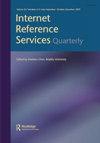高校图书馆员和教授对盗版网站教学和使用情况的调查结果
Q3 Social Sciences
引用次数: 0
摘要
摘要每月使用盗版网站下载数百万篇全文文章。本研究的目的是调查教授和学术图书馆员对学生盗版网站的了解、使用和教学情况。自2019年以来,谷歌学者排名中排名前十的进化、生物信息学和计算生物学期刊的六个学术图书馆员列表服务者和主要通讯作者收到了一份21个问题的调查,其中包括改编的Likert量表和自由文本问题。学术图书馆员(48%)和教授(60.5%)没有积极教授盗版网站。教授的是如何合乎道德和合法地访问全文文章,而不是盗版网站的存在以及如何使用它们。对附属机构的间谍活动、病毒和恶意软件的担忧是教授和图书馆员的担忧。Sci-Hub仍然是最知名的盗版网站。图书馆员和教授对附属机构提供的期刊标题感到满意,但希望为他们的研究提供额外的资源。易用性仍然是使用盗版网站的原因,而访问全文文章的成本仍然是图书馆员和教授们关注的问题。本文章由计算机程序翻译,如有差异,请以英文原文为准。
Survey Results from Academic Librarians and Professors on Teaching and Using Pirate Websites
Abstract Millions of full-text articles are downloaded per month using pirate websites. The purpose of this study was to survey professors and academic librarians on their knowledge, usage and teaching of pirate websites to students. A 21-question survey with adapted Likert scale and free text questions was sent to six academic librarian listservs and primary corresponding authors of top ten evolutionary and bioinformatics and computational biology journals since 2019 from Google Scholar rankings. Academic librarians (48%) and professors (60.5%) are not actively teaching about pirate websites. What is taught is how to ethically and legally access full-text articles, not the existence of pirate websites and how to use them. Concerns about espionage, viruses, and malware for affiliated institutions are concerns for professors and librarians. Sci-Hub continues to be the most known of pirate websites. Librarians and professors are satisfied with the selection of journal title offerings from their affiliated institutions, but desire additional resources for their research. Ease of use continues to be a reason why pirate websites are used, and cost in accessing full-text articles continues to be a concern for librarians and professors.
求助全文
通过发布文献求助,成功后即可免费获取论文全文。
去求助
来源期刊

Internet Reference Services Quarterly
Social Sciences-Library and Information Sciences
CiteScore
2.40
自引率
0.00%
发文量
13
期刊介绍:
Internet Reference Services Quarterly tackles the tough job of keeping librarians up to date with the latest developments in Internet referencing and librarianship. This peer-reviewed quarterly journal is designed to function as a comprehensive information source librarians can turn to and count on for keeping up-to-date on emerging technological innovations, while emphasizing theoretical, research, and practical applications of Internet-related information services, sources, and resources. Librarians from any size or type of library in any discipline get the knowledge needed on how to best improve service through one of the most powerful reference tools available on the Internet.
 求助内容:
求助内容: 应助结果提醒方式:
应助结果提醒方式:


